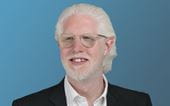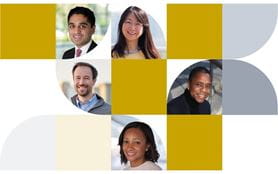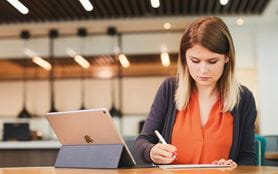Breakthrough for visually impaired lawyers
Related people
Headlines in this article
Related news and insights
Publications: 11 December 2023
Publications: 11 December 2023
Publications: 11 December 2023
Publications: 11 December 2023
Responsible AI: navigating the risks and embracing the possibilities
Detailed document review is particularly challenging for visually impaired lawyers, but a start-up company working within A&O’s tech innovation space, Fuse, has simplified the task by harnessing technology.

One of the most painstaking tasks faced by lawyers is the detailed review of lengthy legal documents. It is especially time-consuming for people with visual impairments – just ask Feargus MacDaeid, who is registered blind, and Nnamdi Emelifeonwu.
The two former lawyers, who met in 2013 at Freshfields, where Nnamdi was a trainee and Feargus an associate, having recently joined from A&O, found themselves over the years coming back to the issue of how to simplify this work.
They turned to technology for a solution, which they named Define. With seed funding, the support of Fuse and its first customers – including A&O – secured, their initiative is on the road to redefining the approach to document review.
Most lawyers search for information by using the ‘Ctrl-F’ function; scrolling up and down; flicking back and forth through a hard copy; or working on a split screen. It can be a difficult task, made more so by visual impairment.
“You notice the efficiency drag when you’re visually impaired,” Feargus says, “even with something as simple as accessing information within a document. That’s the direction we tackled the problem from – if the information is in the document, why is accessing it so complicated?”
Something I might perceive as a weakness could be seen by others as a strength.
Prototype proved the concept
Neither classed themselves as technology experts but they built a prototype. Though slow at first and full of bugs, it was enough to prove the concept had the potential for them to set up Define. Now with an international team of ten, the system has been successfully commercialised.
They describe Define as a 360° review and redrafting tool that plugs into Microsoft Word, allowing the reviewer to highlight defined terms and references and make amendments throughout the document without leaving the page they are working on. The terms and cross-references pop up in easy-to-read dialogue boxes, so the reviewer can make changes in real time without losing context.
In September 2020, Define closed a round of seed funding from high-profile investors, including Dan Cobley, the former MD of Google UK, and Dragons’ Den panellist Nick Jenkins.
Ghazi AbuYounis, a visually impaired associate in A&O’s London Banking practice, is using the new technology. He was excited about Feargus’s involvement, given Feargus was instrumental in Ghazi’s going into law, encouraging him at a time when others said the reading involved would be too difficult.
Ghazi had approached Feargus at an event organised by the charity Blind in Business. Feargus, then at A&O, was on the panel. “He told me to give it my best shot,” Ghazi says. “Something I might perceive as a weakness could be seen by others as a strength. It encouraged me to look at things from a different perspective and to apply to A&O.”
For anyone with a disability, having the right technology can make all the difference. We just need to be creative in how we use it.
Attitudes and old habits
As Ghazi says: “For anyone with a disability, having the right technology can make all the difference. We just need to be creative in how we use it.”
Feargus agrees, but points out that while the technology is there, attitudes sometimes are not. “Old work practices often persist – some people still prefer to mark up documents by hand, even though a visually impaired lawyer can find it impossible to work in manuscript. That can mean people avoid working with you because they don’t want to adapt the way they work.
“In the end, it’s about striking a balance between people shifting how they work slightly, and technology enabling more efficient working.”
Ghazi has experienced similar issues, so his approach is to be clear from the start. “I try to have open and honest conversations about my impairment. People are very supportive but sometimes they do forget.”
Psychological pressures
Feargus, who describes himself as “someone of ability who happens to have a disability”, acknowledges that not everyone feels comfortable being open – in fact many of the challenges people with disabilities face are hidden.
“It’s almost like you’re doubly impaired,” he says. “You have the physical disability, and then you have the psychological pressures – the performance and status anxiety. You constantly ask yourself, ‘What if I don’t see something? What happens if I’m taking longer to complete a task than anyone else?’
“People don’t see what goes on in your head. I find the mental pressure of coping with disability a lot more difficult than the disability itself.”
Ghazi feels that pressure too, in a job where attention to detail is vital. “I do end up double and triple-checking everything because I’m being assessed like everyone else.”
He has always enjoyed strong support within A&O, he says, and feels that processes should be clear and streamlined for all people with disabilities in the workplace. “Businesses must ensure systems are in place so that people know how to access what they need. Everyone should be supported to perform at their best.”
Game-changer
Nnamdi believes that Define’s solution could turn out to be a real game-changer for all lawyers, not just for those with visual impairments or dyslexia. “It wasn’t until we created the prototype that I realised how much difference the technology would make to the legal industry as a whole,” he says.
Additionally, with many more people working from home, both during the Covid-19 crisis and beyond, the benefits of Define could be even greater in removing the need for printed documents and extra monitors.
As Ghazi says: “Define makes remote working easier by allowing me to review documents on screen without the need to print them in a large font size. A&O installed it remotely during lockdown and it’s given me the support I need to work from home.”
Feargus agrees: “It has hit home just how much this technology will help any lawyer,” he says. “So really, what was the answer to one person’s problem turned out to be everyone’s solution.”
Help where it is needed
Disability is an area in which A&O works closely with our people who have additional needs to understand their personal situation and to provide the specific support they require.
Much of this work is done in the background, in order not to draw attention to the support or adjustments people need, so that they can feel confident in pursuing their careers like everybody else.
We know that, as with other areas of diversity, it is the responsibility of us all to be conscious of the extra challenges some colleagues face so that we are fully supportive and enable people to be as open as they choose about their disabilities.
This is even more important in the context of the potential health risks from Covid-19 and the impact of increased social isolation during lockdowns. We have consulted with our disabled community to ensure everyone has necessary support while working from home and as we begin to return to our offices.
Across our network, we partner with disability experts to review our HR and recruitment processes and offer disability awareness training internally where needed. We also partner with organisations to promote ourselves to graduates and lawyers with disabilities, and we work with a number of charities focused on specific conditions, for example Blind in Business. We now include disability data in our UK Pay Gap Reporting.
We respect people’s wishes about how open they want to be, but also know that talking about issues improves our understanding and the support we can give as colleagues.
Nnamdi Emelifeonwu
Co-Founder at Define
Feargus MacDaeid
Co-Founder at Define
A&O: 2010 - 2012




